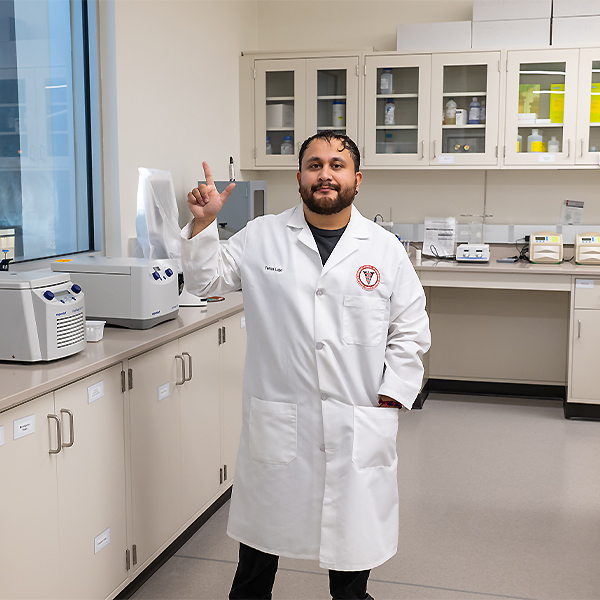
One Health Ph.D. student explores One Health principles to broaden his passion in cancer research.
Tomas Lugo’s fascination with research and discovery goes all the way back to his childhood. It wasn’t until later in life that he found his research interest in cancer: one of the most challenging and complex diseases in our world.
For several years, he worked as a research scientist at University of Texas MD Anderson and as a molecular medical laboratory scientist at Memorial Hermann Health System in Houston, Texas. However, he was still filled with curiosity and an eagerness to learn more about the role cancer plays in One Health – the interconnectedness of humans, animals and ecosystem health.
As soon as Texas Tech University’s School of Veterinary Medicine launched it’s innovative Ph.D. in One Health Sciences program, Tomas Lugo immediately applied without hesitation. Today he is part of the inaugural class getting to do what he loves most – research, learning and discovering ways to improve One Health.
His story has brought him to Amarillo, Texas to pursue his Ph.D. with some of the
best researchers around. Let’s get to know Tomas Lugo through a series of questions. 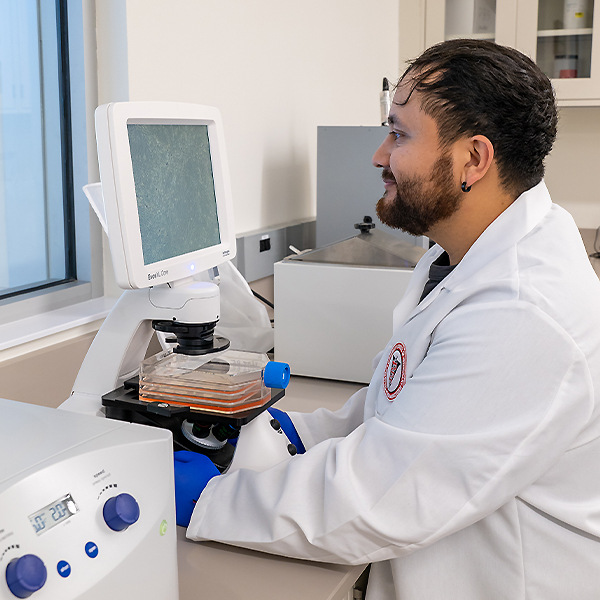
What are you passionate about in research?
My passion for research lies in unraveling the unknown and embracing the ongoing journey of learning. Research provides an avenue for me to channel this passion, ultimately aiming to enhance the well-being of both humans and animals. The One Health approach to research deeply resonates with me, largely because of my personal background and experiences.
During my undergraduate studies, I delved into research and quickly recognized the paramount importance of the environment, particularly in how it influences survival rates. My tenure as a veterinary technician further opened my eyes to the intricate relationship between human and animal health. This not only encompasses physical well-being but also the profound emotional bond shared between humans and animals.
My subsequent work in human cancer research underscored striking similarities in disease
pathways across both humans and animals. It became evident that environmental factors
play a crucial role in cancer development and progression. The holistic perspective
offered by a One Health approach allows me to integrate my varied experiences and
craft a comprehensive approach to cancer research.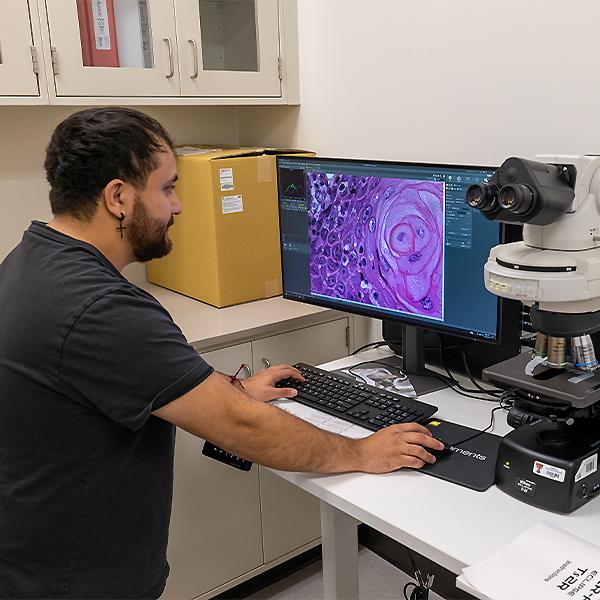
How did you find your passion in research?
I believe my passion for research began when I was little kid. I always questioned everything and wanted to explore everything. Later in life, my passion began to mature when I did research as an undergraduate at Texas Tech. In fact, I was a research assistant looking at Bobwhite Quail survival rates and the environmental factors affecting Bobwhite for the Texas Tech Quail research team in the Davis College of Agricultural Sciences and Natural Resources. Finally, while working at the University of Texas MD Anderson Cancer Center, I was able to see how important research is and how it can positively impact our lives.
What inspires you to pursue what you love to do every day?
As we all know, research can be challenging. However, what motivates me daily is the
understanding that every setback and triumph in research brings us closer to comprehending
our world. This is especially true in my focus on cancer, where heartfelt conversations
with patients and their families continually inspire me, fueling the hope that my
work might advance our understanding of the disease. 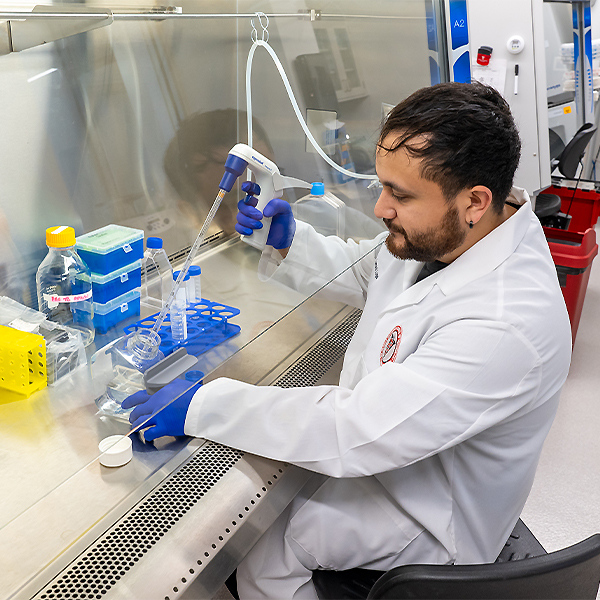
What are your plans after completing the One Health Ph.D. Program?
Upon completing the One Health Ph.D. Program, I aspire to either join academia as a faculty member or establish my own research laboratory. Teaching has always been a passion of mine, especially when it comes to mentoring undergraduates and newcomers in the research lab. I find immense satisfaction in guiding them towards critical thinking, helping them navigate challenges, and igniting their enthusiasm for exploring new research avenues.
What brings me the greatest fulfillment is witnessing individuals discover and pursue their own passions in research. I believe it's crucial not just to narrow down on specific issues but to cultivate an understanding of the larger, overarching problems. This holistic approach is aligned with the One Health concept, emphasizing the interconnectedness of health across humans, animals and the ecosystem.
Why did you choose Texas Tech?
I chose Texas Tech because of my deep connection with the university since my undergraduate.
I fell in love with the friendly aspect of the school and its prestigious standing.
From my undergraduate degree to my master’s degree and finally my Ph.D. degree, Texas
Tech has always been home for me. 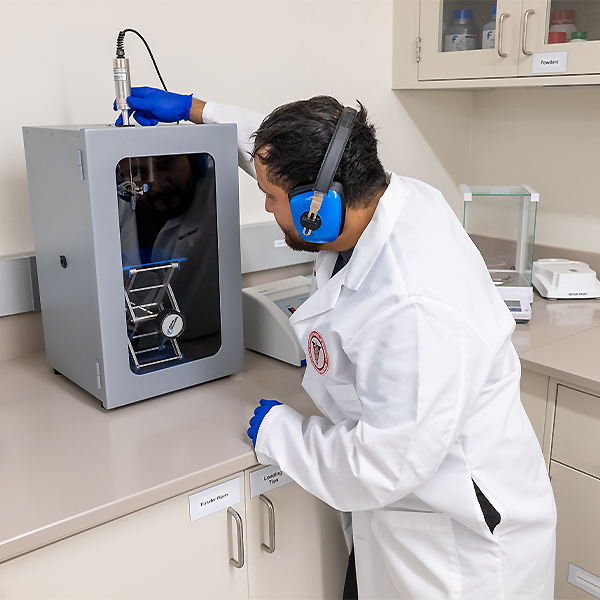
How is it being part of the inaugural One Health Ph.D. class at the School of Veterinary Medicine?
Being part of the inaugural One Health Ph.D. class is both an honor and a joy. We have the unique opportunity to set the pillars and standards for future classes. Staying true to myself, I embraced the uncertainty and unknown of a new program, forging a path and shedding light for others to follow in our footsteps to make a great program.
What is your research focus?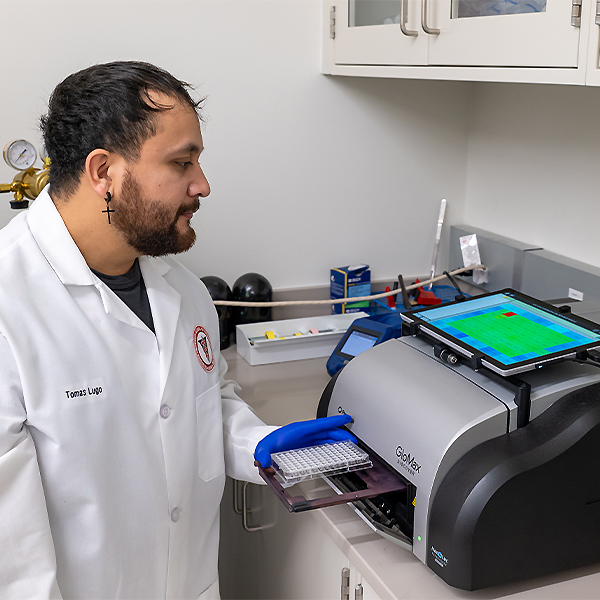
My current research is centered on colorectal cancer, specifically in developing accurate 3D models such as spheroids and organoids outside the human body for drug testing. These innovative models closely mimic the complexities of actual human tissues, enabling us to bypass the need for animal testing. One of the main advantages of our approach is the ability to test drugs tailored to distinct stages of cancer, ensuring patient safety by eliminating potential adverse reactions.
Furthermore, our models reproduce the intricate interplay between cancerous and normal tissues, giving us a comprehensive view of the effects of prospective drugs on both. This provides invaluable insights into predicting the efficacy of drugs or other therapeutic compounds before administering them to patients. Concurrently, we are working on adapting these models for both human and animal applications, reinforcing the universality and potential of our research.
Who is your mentor(s) and how are you working together?
My current mentors are Dr. Annelise Nguyen and Dr. Stephanie Myers. Dr. Nguyen is a renowned toxicologist, and her area of expertise is in cellular communication in 3D models. She has been able to advance the area of cancer and toxicology, so having her as a mentor has given me opportunities to learn from her expertise and use some of the new technology she has developed.
On the other hand, Dr. Myers is a veterinary pathologist and attended Johns Hopkins University for her Ph.D., focusing on drug therapy and efficacy. Her expertise has allowed me to understand the effect of different drugs and synergy on using combination drugs and their effect on cells.
Both make a great team and allow me to explore problems through different viewpoints and improve my questions to be tangible and reasonable. I also learned many lab techniques and skills from them, but more importantly, they helped me refine my ways of critical thinking and skills.
What are your favorite things to do outside of school?
I have many hobbies from exploring the outdoors to playing sports. Recently, I grew a passion of taking pictures of Palo Duro Canyon State Park and exploring the plains of West Texas. In my undergraduate, I took an ornithology calls course which is the study of birds and their sounds and songs. I really enjoyed this course so much that I like to brush up on my bird calls by birdwatching.
I love basketball and if I have time I enjoy spending most of my time shooting some hoops in the neighborhood parks and schools. Most may not know this about me, but I consider myself very adventurous. In fact, I do some extreme sports like glacier climbing in Alaska or white water rafting even though my swimming skills are not very advanced to say the least.
Tell us a little bit about your family. How has the culture you grew up around influenced you to be the person you are today?
My family is a very traditional Hispanic family coming from Mexico and Texas. The culture of hard work and grit along with compassion has been established in me since I was young.
In addition, my culture loves to cook and dance and in our free time we love to share those traditions with others. I love Dia de los Muertos which is a holiday to honor the dead and very important in our culture. I have recently shared that event with my fellow One Health Ph.D. graduate classmates. Whenever I go back, I love to spend time with my friends and play soccer and wall ball. Growing up in El Paso, Texas with its diverse culture allowed me to experience many traditions such as quinceañeras and Cinco de Mayo.
